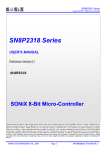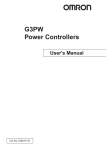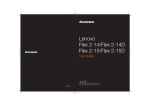Download Lenovo E46 User's Manual
Transcript
Lenovo E46 User Guide V1.0 Notes • Before using this information and the product it supports, be sure to read Important safety information and Notices in the User Guide attached with the computer first. • Some instructions in this guide may assume that you are using Windows® 7. If you are using other Windows operating system, some operations may be slightly different. If you are using other operating systems, some operations may not apply to you, but it won’t substantially affect your use of this computer. • The features described in this guide are common to most models. Some features may not be available on your computer and/or your computer may include features that are not described in this user guide. This manual is for your reference only. For more information, please see the User Guide attached with the computer. First Edition (Jan. 2010) © Copyright Lenovo 2010. LENOVO products, data, computer software, and services have been developed exclusively at private expense and are sold to governmental entities as commercial items as defined by 48 C.F.R. 2.101 with limited and restricted rights to use, reproduction and disclosure. LIMITED AND RESTRICTED RIGHTS NOTICE: If products, data, computer software, or services are delivered pursuant a General Services Administration “GSA” contract, use, reproduction, or disclosure is subject to restrictions set forth in Contract No. GS-35F-05925. Contents Chapter 1. Getting to know your computer ....................................... 1 Top view........................................ 1 Left-side view ............................... 4 Right-side view............................. 6 Front view ..................................... 7 Rear view....................................... 8 Bottom view .................................. 9 Chapter 2. Learning the basics.... 11 First use........................................ 11 Using the touchpad.................... 14 Using the keyboard.................... 15 Special buttons............................ 18 System status indicators............ 20 Securing your computer............ 21 Connecting external devices..... 23 Chapter 3. Using the Internet .... 27 Wired connection ....................... 27 Wireless connection ................... 29 Index ............................................ 31 i Contents ii Chapter 1. Getting to know your computer Top view ------------------------------------------------------------------------------------------- 4 5 3 1 7 6 8 9 2 10 12 11 2 Note: The illustrations in this manual may differ from the actual product. Please refer to the actual product. 1 Chapter 1. Getting to know your computer Attention: • Do NOT open the display panel beyond 180 degree. When closing the display panel, be careful NOT to leave pens or any other objects in between the display panel and the keyboard. Otherwise, the display panel may be damaged. Power button System status Press this button to open OneKey Rescue System (If OneKey Rescue System has been preinstalled) when the computer is powered off. Note: For details, see "OneKey Rescue System" in the User Guide attached with the computer. Use this button to mute/unmute the computer. Mute button Integrated 2 For details, see “System status indicators” on page 20. indicators OneKey Rescue System button Custom button Press this button to turn on the computer. camera (specific models only) Keyboard light (specific models only) Wireless LAN antennas (specific models only) Press this button to set and launch a self defined program, file or a Web site. Use the camera for video communication. The keyboard light illuminates the keyborad in the dark. The built-in antennas ensure optimal reception of wireless communication radio. Chapter 1. Getting to know your computer Computer 10 11 12 display Fingerprint reader (specific models only) Touchpad The LCD display provides brilliant visual output. With the fingerprint reader you can register fingerprints and use them as passwords to secure your computer. The touchpad functions as a conventional mouse. Note: For details, see “Using the touchpad” on page 14. The built-in microphone (with noise reduction) can be used Built-in for video conferencing, voice narration, or simple audio microphone recordings. 3 Chapter 1. Getting to know your computer Left-side view -----------------------------------------------------------------------------E46A/E46G 1 2 3 4 5 6 7 8 2 3 6 5 6 7 8 E46L 1 Kensington slot Attach a security lock (not supplied) here. Note: For details, see “Attaching a security lock (not supplied)” on page 21. Fan louvers Dissipate internal heat. Note: Make sure that none of the fan louvers are blocked or else overheating of the computer may occur. VGA port 4 Connects to external display devices. Chapter 1. Getting to know your computer eSATA/USB Connects to eSATA or USB devices. combo port Note: For details, see “Connecting a universal serial bus (USB) device” on page 26. RJ-45 port Connects to an Ethernet network. Note: For details, see “Wired connection” on page 27. USB port Connects to USB devices. Note: For details, see “Connecting a universal serial bus (USB) device” on page 26. Microphone jack Headphone jack Connects to an external microphone. Connects to an external headphone. Attention: • Listening to music at high volume over extended periods of time may damage your hearing. 5 Chapter 1. Getting to know your computer Right-side view -------------------------------------------------------------------------- 1 2 USB port 3 4 Connects to USB devices. Note: For details, see “Connecting a universal serial bus (USB) device” on page 26. ExpressCard® slot Insert ExpressCard device here. Note: For details, see “Inserting an ExpressCard/34 device” on page 25. Optical drive (specific models only) Serial port 6 Your computer comes with an optical drive, such as a CD/ DVD drive. Connects to devices with serial port. Chapter 1. Getting to know your computer Front view --------------------------------------------------------------------------------------- 3 2 1 Display latch Release this latch to open the display. Memory card slot Insert memory cards (not supplied) here. Note: For details, see “Using memory cards (not supplied)” on page 23. Integrated wireless device switch Use this switch to turn on/off the wireless radio of all wireless devices on your computer. 7 Chapter 1. Getting to know your computer Rear view ----------------------------------------------------------------------------------------- 1 AC power 2 3 Connect the AC adapter here. adapter jack Note: For details, see the User Guide attached with the computer. USB port Connects to USB devices. Note: For details, see “Connecting a universal serial bus (USB) device” on page 26. Fan louvers Dissipate internal heat. Note: Make sure that none of the fan louvers are blocked or else overheating of the computer may occur. 8 Chapter 1. Getting to know your computer Bottom view ---------------------------------------------------------------------------------- 2 4 7 5 3 6 1 7 9 Chapter 1. Getting to know your computer Hard disk Houses the computer’s hard disk drive. drive(HDD) compartment Battery latch spring loaded The spring-loaded battery latch keeps the battery pack secured in place. Battery pack For details, see the User Guide attached with the computer. Mini PCI Houses the computer’s wireless module. ExpressCard slot compartment Battery latch manual Central The manual battery latch is used to keep the battery pack secured in place. House the computer's CPU and memory. Processing Unit (CPU)/Memory (RAM) compartment Speakers 10 The speakers provide rich and powerful sound. Chapter 2. Learning the basics Chapter 2. Learning the basics First use ---------------------------------------------------------------------------------------------- Read the manuals Read the supplied manuals before using your computer. Connect to the power The supplied battery pack is not fully charged at purchase. To charge the battery and begin using your computer, insert the battery pack and connect the computer to an electrical outlet. The battery is automatically charged while the computer is running on AC power. Install the battery pack Refer to the supplied User Guide attached with the computer to install the battery pack. Connect the computer to an electrical outlet 1 Connect the power cord to the AC adapter. 2 Connect the AC adapter to the AC power adapter jack of the computer firmly. 3 Plug the power cord into an electrical outlet. 11 Chapter 2. Learning the basics Turn on the computer Press the power button to turn on the computer. Configure the operating system You may need to configure the operation system when it is first used. The configuration process may include the procedures below. • Accepting the end user license agreement • Configuring the Internet connection • Registering the operating system • Creating a user account Putting your computer into standby/sleep state or shutting it down When you finish working with your computer, you can put it into standby/sleep state or shut it down. Putting your computer into standby/sleep state If you will be away from your computer for only a short time, put the computer into standby/sleep state. When the computer is in standby/sleep state, you can quickly wake it to resume use, and bypass the startup process. 12 Chapter 2. Learning the basics To put the computer into standby state, do one of the following. • Click start and select Stand By from the Turn Off Computer menu. • Press Fn + F1. Note: Wait until the power indicator light starts blinking (indicating that the computer is in standby state) before you move your computer. Moving your computer while the hard disk is spinning can damage the hard disk, causing loss of data. To wake the computer, do one of the following. • Press the power button. • Press any key on the keyboard. Shutting down your computer If you are not going to use your computer for a day or two, shut it down. To shut down your computer, click start and select Turn Off from the Turn Off Computer menu. 13 Chapter 2. Learning the basics Using the touchpad --------------------------------------------------------------------- 1 2 3 Touchpad To move the cursor on the screen, slide your fingertip over the pad in the direction in which you want the cursor to move. Left click button The function corresponds to that of the left mouse button on a conventional mouse. Right click button The function corresponds to that of the right mouse button on a conventional mouse. Note: You can enable/disable the touchpad using Fn+F8. The touchpad may be disabled when manipulated with two fingers together. 14 Chapter 2. Learning the basics Using the keyboard ---------------------------------------------------------------------Your computer has a numeric keypad and function keys incorporated in its standard keyboard. Numeric keypad The keyboard has keys that, when enabled, work as a 10-key numeric keypad. To enable or disable the numeric keypad, press Fn+Insert. Note: The indicator will light on if the numeric keypad is enabled. 15 Chapter 2. Learning the basics Function key combinations Through the use of the function keys, you can change operational features instantly. To use this function, press and hold Fn ; then press one of the function keys . 2 1 16 Chapter 2. Learning the basics The following describes the features of each function key. Fn + Esc: Turn on/off the keyboard light. (specific models only) Fn + F1: Enter standby/sleep mode. Fn + F2: Turn on/off the backlight for the LCD screen. Fn + F3: Shift to other connected display devices. Fn + F4: Open the interface for display resolution settings. Fn + F5: Open the interface for integrated wireless devices settings (enable/disable). Fn + F8: Enable/Disable the touchpad. Fn + F9: Start/Pause playback of Windows Media Player. Fn + F10: Stop playback of Windows Media Player. Fn + F11: Skip to the previous track. Fn + F12: Skip to the next track. Fn + Insert Enable/Disable the numeric keypad. Fn + Delete Enable/Disable the Scroll Lock. Fn + PrtSc: Activate the system request. Fn + Pause Activate the break function. Fn + ↑/↓ : Increase/Decrease display brightness. Fn + ←/→ : Decrease/Increase volume level. 17 Chapter 2. Learning the basics Special buttons ------------------------------------------------------------------------------ 18 Chapter 2. Learning the basics Mute button Mute/Unmute the computer. Custom button Under Windows operating systems, press this button to launch a selfdefined program, file or a Web site. Note: To re-define the Custom button, select Self-defined program setting (start → All Programs → Lenovo → Energy Management → Self-defined program setting). OneKey Rescue System button • When the computer is powered-off, press this button to enter the OneKey Rescue System if Lenovo OneKey Rescue System has been preinstalled. • Under Windows operating systems, press this button to start Lenovo OneKey Recovery. Note: For details, see "OneKey Rescue System" in the User Guide attached with the computer. 19 Chapter 2. Learning the basics System status indicators -------------------------------------------------These indicators inform you of the computer status. 1 5 20 6 2 7 3 8 Wireless communication indicator Bluetooth indicator Num lock indicator Caps lock indicator Power status indicator Battery status indicator Hard disk drive indicator Touchpad indicator 4 Chapter 2. Learning the basics Securing your computer ----------------------------------------------------------This section provides information about how to help protect your computer from theft and unauthorized use. Attaching a security lock (not supplied) You can attach a security lock to your computer to help prevent it from being removed without your permission. For details on installing the security lock, please refer to the instructions shipped with the security lock that you have purchased. Refer to the “Right-side view” on page 6 for the location of the Kensington slot. Notes: • Before purchasing any security product, verify that it is compatible with this type of security keyhole. • You are responsible for evaluating, selecting, and implementing the locking devices and security features. Lenovo offers no comment, judgement, or warranty regarding the function, quality or performance of locking devices and security features. 21 Chapter 2. Learning the basics Using passwords Using passwords helps prevent your computer from being used by others. Once you set a password and enable it, a prompt appears on the screen each time you power on the computer. Enter your password at the prompt. The computer cannot be used unless you enter the correct password. Note: This password can be from one to seven alphanumeric characters in any combination. For details about how to set the password, see the help to the right of the screen in BIOS setup utility. Note: To enter BIOS setup utility, press F2 when the Lenovo logo appears on the screen while the computer is starting up. Fingerprint reader With the fingerprint reader, in addition to registering fingerprint information and using it as a password for Windows operating system or Web site logon, you can also launch applications quickly and encrypt private data with your fingerprint to secure your computer. For more details on fingerprint reader, see the Help file of your software. 22 Chapter 2. Learning the basics Connecting external devices -----------------------------------------Your computer has a wide range of built-in features and connection capabilities. Using memory cards (not supplied) Your computer supports the following types of memory cards: • Secure Digital (SD) card • Secure Digital High Capacity (SDHC) card • MultiMediaCard (MMC) • Memory Stick (MS) • Memory Stick PRO (MS PRO) • xD picture (xD) card • xD picture type card Notes: • Insert ONLY one card in the slot at a time. • This card reader does not support SDIO devices (e.g., SDIO Bluetooth, etc.). 23 Chapter 2. Learning the basics Inserting a memory card 1 Push the dummy card until you hear a click. Gently pull the dummy card out of the memory card slot. Note: The dummy card is used for preventing dust and small particles from entering the inside of your computer when the memory card slot is not in use. Retain the dummy card for future use. 2 Push the card directly into the memory card slot until it reaches the end. Removing a memory card 1 Push the memory card until you hear a click. Gently pull the memory card out of the memory card slot. 2 Insert the dummy card to the memory card slot. Note: Before removing the memory card, unable it by Windows Safely Remove Hardware utility to avoid data corruption. Connecting an ExpressCard device Your computer comes with an ExpressCard/34 slot used for connecting ExpressCard devices. Note: Only use the ExpressCard/34 devices. 24 Chapter 2. Learning the basics Inserting an ExpressCard/34 device 1 Push the dummy card until you hear a click. Gently pull the dummy card out of the ExpressCard slot. 2 Slide the ExpressCard device in with the front label facing upward until it clicks into place. Removing an ExpressCard/34 device 1 Push the ExpressCard device until you hear a click. 2 Gently pull the ExpressCard device out of the ExpressCard slot. Notes: • Before removing the ExpressCard/34 device, unable it by Windows Safely Remove Hardware utility. • The dummy card is used for preventing dust and small particles from entering the inside of your computer when the ExpressCard slot is not in use. Retain the dummy card for future use. 25 Chapter 2. Learning the basics Connecting a universal serial bus (USB) device Your computer comes with three USB ports compatible with USB devices. Note: When using a high power consumption USB device such as USB ODD, use the external device’s power adapter. Otherwise, the device may not be recognized, or system shut down may result. Connecting a Bluetooth enabled device (specific models only) If your computer has an integrated Bluetooth adapter card, it can connect to and transfer data wirelessly to other Bluetooth enabled devices, such as notebook computers, PDAs and cell phones. You can transfer data between these devices without cables at up to 10 meters range in open space. Enabling Bluetooth communications on your computer 1 Slide the integrated wireless device switch to 2 Press Fn + F5 to make configuration. . Note: When you do not need to use the Bluetooth function, turn it off to save battery power. 26 Chapter 3. Using the Internet Chapter 3. Using the Internet As a global network, the Internet connects computers worldwide, providing services such as e-mailing, information searching, electronic commerce, Web browsing and entertainment. You can connect the computer to the Internet in the following ways: Wired connection: uses physical wiring to connect. Wireless network technology: connect without wiring. Wired connection --------------------------------------------------------------------Wired connection is a reliable and safe way to connect the computer to the Internet. Generally, the following two accessing methods are widely used. Cable Cable Internet services use a cable modem connected to the residential cable TV line. DSL DSL is a family of related technologies that bring high-speed network access to homes and small businesses over ordinary telephone lines. 27 Chapter 3. Using the Internet Hardware connection: Cable DSL Telephone line TV cable Splitter * Splitter * DSL modem * Cable modem * * Not supplied. Note: The above diagrams are for reference only. Actual connection method may vary. Software configuration Consult your Internet Service Provider (ISP) for details on how to configure your computer. 28 Chapter 3. Using the Internet Wireless connection -------------------------------------------------------------------Wireless connection provides mobile access to the Internet, allowing you to stay online anywhere the wireless signal covers. Divided by the signal scales, wireless connection to the Internet can be built based on the following standards. Wi-Fi Wi-Fi networks cover a small physical area, like a home, office, or small group of buildings. An access point is necessary for the connection. WiMAX WiMAX networks connect several Wireless LAN systems to cover a metropolitan area, providing high-speed broadband access without the need for cables. Mobile Broadband The Mobile Broadband network provides Internet access to computers, cell phones and other devices over a large geographic area. Mobile networks are used for data transmission, and access is usually provided by a mobile network operator. A Mobile Broadband SIM card is necessary for the connection. Note: Your computer may not support all wireless connection methods. 29 Chapter 3. Using the Internet Using Wi-Fi/WiMax (specific models only) Enabling wireless connection To enable wireless communications, do the following: 1 Slide the integrated wireless device switch to . 2 Press Fn + F5 to make configuration. Hardware connection Access point * Wi-Fi/WiMax network * Not supplied Software configuration Consult your Internet Service Provider (ISP) and search Windows Help and Support Center for details on how to configure your computer. 30 Index B N Bluetooth Connecting ................................ 26 Numeric Keypad ................................15 C O Camera ........................................... 2, 17 Card reader ........................................ 23 OneKey Rescue System button ...........2 F Function key combinations ............... 16 K Kensington slot .................................... 4 Keyboard Using ......................................... 15 P Password Using .........................................22 Power button ........................................2 S Security ...............................................21 T M Touch pad...........................................14 Microphone Built-in ......................................... 3 31 Index U USB port ....................................... 5, 6, 8 W Wireless LAN Antennas ..................................... 2 32 If your product is not working correctly, DO NOT RETURN IT TO THE STORE. For technical assistance, contact a Lenovo support specialist 24 hours a day by calling toll free 1-877-4 LENOVO (1-877-453-6686). Additionally, you can find support information and updates on the Lenovo Web site located at http://consumersupport.lenovo.com. * Only for the users from the United States. TM www.lenovo.com ©Lenovo China 2010 New World. New Thinking. P/N: 147003151 Printed in China













































